 | Simon Newcomb - Algebra - 1884 - 572 pages
...approaches zero as its limit. Hence, VI. The logarithm of 0 is negative infinity. VII. THEOREM. Tlie logarithm of a product is equal to the sum of the logarithms of its factors. Proof. Let p and q be two factors, and suppose h = log p, k — log q. Then ah = p, ak — q. Multiplying,... | |
 | Simon Newcomb - Algebra - 1884 - 576 pages
...— approaches zero as its limit. Hence, VI. The logarithm of 0 is negative infinity. VII. THEOBEM. The logarithm of a product is equal to the sum of the logarithm's of its factors. Proof. Let p and q be two factors, and suppose h = log p, k = log q. Then... | |
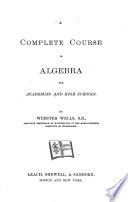 | Webster Wells - Algebra - 1885 - 324 pages
...denote that it alone is negative, the mantissa being Always positive. PROPERTIES OF LOGARITHMS. 342. The logarithm of a product is equal to the sum of the logarithms of its factors. Assume the equations 10* = m ) whence by Art. 334 Í « = logm. 10' = nj ' ly = logw. Multiplying,... | |
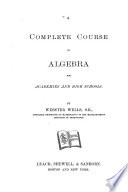 | Webster Wells - Algebra - 1885 - 370 pages
...denote that it alone is negative, the mantissa being always positive. PROPERTIES OP LOGARITHMS. 342. The logarithm of a product is equal to the sum of the logarithms of its factors. Assume the equations , , . , 00, ; whence, by Art. 334, 10* = n ' Multiplying, 10* x 10" = mn, or 10I+»... | |
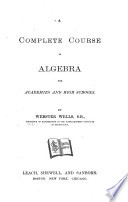 | Webster Wells - 1885 - 368 pages
...denote that it alone is negative, the mantissa being always positive. PROPERTIES OF LOGARITHMS. 342. The logarithm of a product is equal to the sum of the logarithms of its factors. Assume the equations , , . , 00. ; whence, by Art. 334, 10» = n ) (y = logn. Multiplying, 10* x 10*... | |
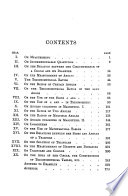 | John Bascombe Lock - Trigonometry - 1885 - 368 pages
...10 and Iog32 10. *211. We give here a formal proof of the following propositions : To prove that (i) The logarithm of a product is equal to the sum of the logarithms of the factors. (ii) The logarithm of a quotieiit is equal to the difference of the logarithms of the... | |
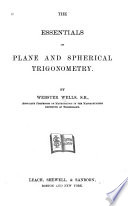 | Webster Wells - Trigonometry - 1887 - 200 pages
...if a is > 1, we have a~" = = — = 0. a* oo Whence by Art. 79, loga0 = — oo . 90. In any system, the logarithm of a product is equal to the sum of the logarithms of its factors. Assume the equations a" — m"t , , . ., fx = losra m, Multiplying, we have a" X a" = mn, or aI+3 =... | |
 | William Steadman Aldis - Algebra - 1887 - 616 pages
...by the definition of a logarithm (Art. 6 1 9), It easily follows that = \oga(mn.p) Thus it follows that the logarithm of a product is equal to the sum of the logarithms of the factors. 625. Similarly by division whence by definition lm lo&» n = xy, - loga»t-loga«, (2)... | |
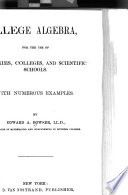 | Edward Albert Bowser - Algebra - 1888 - 868 pages
...infinity. For a'" = — = - =0; therefore logO = — oo. a" QO Also, the logarithm of + oo is + oc. (4) The logarithm of a product is equal to the sum of the logarithms of its factors. For let mn be the product ; let a be the base of the system, and suppose x = log m, y = log n. Then... | |
 | Carl Bruhns - Logarithms - 1889 - 660 pages
...= log A "f log В log ~ = log A — log В log Am = m log A log ГА = i log A, or at full length: the logarithm of a product is equal to the sum of the logarithms of the factors; the logarithm of a quotient is equal to the difference of the logarithms of the Dividend... | |
| |